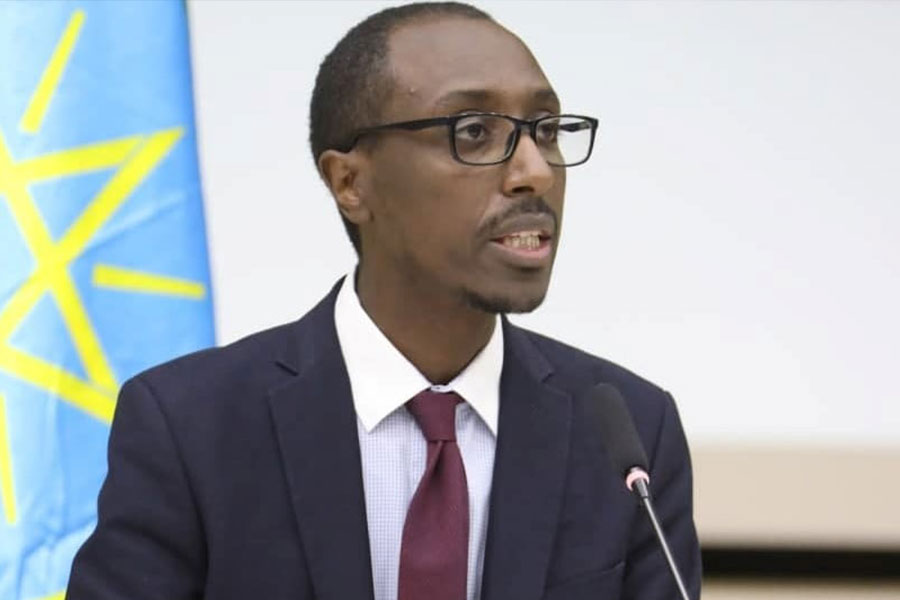
Verbatim | Jul 02,2022
Jan 5 , 2019
By Eden Sahle
It may not seem like it on the surface, but society in Ethiopia incentives individuals to have low self-esteem. It is the sort of culture that prioritises comfort above individuals' personal growth to the point that they are not even sure what they are capable of.
Society generally and negatively judges those who speak highly of themselves. Destructive behaviours - except those believed to be directly associated with substance abuse - are normalised and accepted by society. Having confidence in oneself is subtly ridiculed, which leads to perpetual low self-esteem and subsequently inefficiency. The things we give attention to shape us, even if we do not recognise the negative long-term consequences.
Believing in our skills and abilities makes us successful. Acknowledging our confidence should not be considered as a wrong perception of oneself. Disregarding this could cloud the judgement in our personal and professional lives.
Studies show that people with low self-esteem tend to see the world as a hostile place and themselves as its victim. As a result, they are reluctant to express and assert themselves, miss out on experiences and opportunities and feel powerless to change things.
It is quite common to find people in Ethiopia who despise themselves one way or the other. Appreciating oneself or others is never seen constructively. In society, perceiving oneself as a unique, special and valuable person is considered a wrong perception of oneself.
On the other hand, identifying oneself with negative thoughts - such as powerlessness or just hiding accomplishments - is perceived to be humbleness. It is society’s way of knocking down the individual in us, with a version that conforms to the whims of the group.
A year ago, a relative and her three children who lived in Canada stayed with us for several months. I had only been in contact with her over the phone for years, and finally getting to know her in person, I was impressed with her dedication to imbue her three little boys with self-confidence and a can-do attitude.
She was determined to raise her boys in a much better way than she was raised, which affected her self-confidence, especially after she started living in a developed country. Unfortunately, she had misconstrued what confidence was supposed to be about.
It was a shock to witness that she would allow her children to ill-treat and badmouth her. Her boys have respect for others, or perhaps fear of those who are stern with them, but show no sense of restraint with her.
Unfortunately, she is not the only parent who misinterprets what building confidence in children means. Well-to-do parents in Ethiopia are lax with their children, letting them do and say things most other parents would find abhorrent. However, the key to self-confidence is to believe in oneself, understanding what is important to us and teaching children to do the same. It is about living our lives consistent with our highest values and aspirations.
Confidence does not occur through a negative personal perception of oneself. It is reached when we can do the things we believe are worthwhile with our lives and stay committed to our goals. The strength to make improvements in our lives must come from deep within the very core of our being.
If we do not believe in ourselves and become reliant in our potential, we will never be able to reach our abilities. We become what we think, and we all need to understand what our passion in life is to reach our potential.
There was a time when I did not know what it takes to be confident. I thought living life responding to the expectations of family, friends and society was normal. As an adult, I came to realise that self-confidence comes from self-awareness and having control over one’s thoughts and emotions.
It is about gaining self-confidence based on our thinking, not our past experiences. By believing in our potential, we will find the courage to take immediate action on our goals. We will do a service to ourselves if we never compromise to grow due to self-limiting doubts. Instead, embracing confidence and our abilities allows us to accomplish virtually anything we put our mind to.
In a standoff, if what we are fighting for has value, overconfidence most often leads to success, according to a study by the University of Edinburgh and the University of California-San Diego did. Even when we are not right, being confident can help us get what we want. Similarly, a study by the University of Texas showed that students who had confidence in their ability even while receiving criticism performed better later than those who were simply told to aim for higher standards.
It is important to become conscious of our attitude and guide our focus toward trusting our potential. We must admit that we all have our talents, skills and abilities that make us extraordinary. Incorporating this awareness into our attitude and personality not only helps us look for the good in us but also in other people as well.
PUBLISHED ON
Jan 05,2019 [ VOL
19 , NO
975]

Verbatim | Jul 02,2022

Films Review | Jan 25,2020

Viewpoints | Sep 18,2021

Commentaries | Feb 29,2020

Commentaries | Sep 10,2021

Commentaries | Jan 03,2021

Sunday with Eden | Oct 20,2024

Editorial | Mar 05,2022

Radar | Aug 16,2020

Commentaries | Jul 02,2022

Photo Gallery | 176506 Views | May 06,2019

Photo Gallery | 166722 Views | Apr 26,2019

Photo Gallery | 157252 Views | Oct 06,2021

My Opinion | 136918 Views | Aug 14,2021

Dec 22 , 2024 . By TIZITA SHEWAFERAW
Charged with transforming colossal state-owned enterprises into modern and competitiv...

Aug 18 , 2024 . By AKSAH ITALO
Although predictable Yonas Zerihun's job in the ride-hailing service is not immune to...

Jul 28 , 2024 . By TIZITA SHEWAFERAW
Unhabitual, perhaps too many, Samuel Gebreyohannes, 38, used to occasionally enjoy a couple of beers at breakfast. However, he recently swit...

Jul 13 , 2024 . By AKSAH ITALO
Investors who rely on tractors, trucks, and field vehicles for commuting, transporting commodities, and f...

Oct 18 , 2025
The political establishment, notably the ruling party and its top brass, has become p...

Oct 11 , 2025
Ladislas Farago, a roving Associated Press (AP) correspondent, arrived in Ethiopia in...

Oct 4 , 2025
Eyob Tekalegn (PhD) had been in the Governor's chair for only weeks when, on Septembe...

Sep 27 , 2025
Four years into an experiment with “shock therapy” in education, the national moo...

Oct 18 , 2025 . By NAHOM AYELE
In a sweeping reform that upends nearly a decade of uniform health insurance contribu...

A bill that could transform the nutritional state sits in a limbo, even as the countr...

Oct 18 , 2025 . By SURAFEL MULUGETA
A long-planned directive to curb carbon emissions from fossil-fuel-powered vehicles h...

Oct 18 , 2025 . By BEZAWIT HULUAGER
Transaction advisors working with companies that hold over a quarter of a billion Bir...